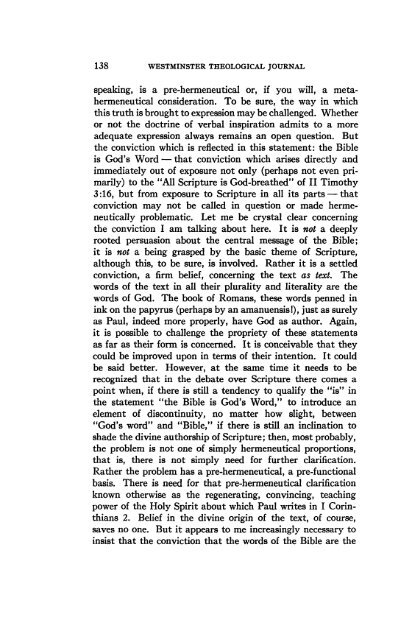NEW TESTAMENT THEOLOGY
Issues%20in%20New%20Testament%20Theology
Issues%20in%20New%20Testament%20Theology
Create successful ePaper yourself
Turn your PDF publications into a flip-book with our unique Google optimized e-Paper software.
138 WESTMINSTER THEOLOGICAL JOURNAL<br />
speaking, is a pre-hermeneutical or, if you will, a metahermeneutical<br />
consideration. To be sure, the way in which<br />
this truth is brought to expression may be challenged. Whether<br />
or not the doctrine of verbal inspiration admits to a more<br />
adequate expression always remains an open question. But<br />
the conviction which is reflected in this statement: the Bible<br />
is God's Word — that conviction which arises directly and<br />
immediately out of exposure not only (perhaps not even primarily)<br />
to the "All Scripture is God-breathed" of II Timothy<br />
3:16, but from exposure to Scripture in all its parts — that<br />
conviction may not be called in question or made hermeneutically<br />
problematic. Let me be crystal clear concerning<br />
the conviction I am talking about here. It is not a deeply<br />
rooted persuasion about the central message of the Bible;<br />
it is not a being grasped by the basic theme of Scripture,<br />
although this, to be sure, is involved. Rather it is a settled<br />
conviction, a firm belief, concerning the text as text. The<br />
words of the text in all their plurality and laterality are the<br />
words of God. The book of Romans, these words penned in<br />
ink on the papyrus (perhaps by an amanuensis!), just as surely<br />
as Paul, indeed more properly, have God as author. Again,<br />
it is possible to challenge the propriety of these statements<br />
as far as their form is concerned. It is conceivable that they<br />
could be improved upon in terms of their intention. It could<br />
be said better. However, at the same time it needs to be<br />
recognized that in the debate over Scripture there comes a<br />
point when, if there is still a tendency to qualify the "is" in<br />
the statement "the Bible is God's Word," to introduce an<br />
element of discontinuity, no matter how slight, between<br />
"God's word" and "Bible," if there is still an inclination to<br />
shade the divine authorship of Scripture; then, most probably,<br />
the problem is not one of simply hermeneutical proportions,<br />
that is, there is not simply need for further clarification.<br />
Rather the problem has a pre-hermeneutical, a pre-functional<br />
basis. There is need for that pre-hermeneutical clarification<br />
known otherwise as the regenerating, convincing, teaching<br />
power of the Holy Spirit about which Paul writes in I Corinthians<br />
2. Belief in the divine origin of the text, of course,<br />
saves no one. But it appears to me increasingly necessary to<br />
insist that the conviction that the words of the Bible are the


